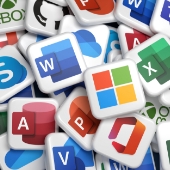 Microsoft Loop is a new app that promises to help boost your productivity. It combines a powerful and flexible canvas with portable components that stay in sync and move freely across all Microsoft 365 apps. Let’s take a closer look at what this app has to offer.
Microsoft Loop is a new app that promises to help boost your productivity. It combines a powerful and flexible canvas with portable components that stay in sync and move freely across all Microsoft 365 apps. Let’s take a closer look at what this app has to offer.
Microsoft Loop is essentially a collaboration tool that allows users to centralize work and efficiently operate synchronously.
Based on Microsoft’s Fluid Framework, Loop provides users with “a powerful and flexible canvas.” The app’s portable components allow users to easily work together and build on each other’s ideas, regardless of location, as project elements can easily be synced and moved across different Microsoft 365 apps.
How does Microsoft Loop work?
Microsoft Loop aims to enable multiple users to collaborate more effectively than ever before through its three structural elements: Loop components, Loop pages, and Loop workspaces.
Loop components
Loop components are live, interactive, and collaborative objects such as tables, notes, and tasks that users can embed in chat and email messages. This makes sharing among teams easier, and allows them to always work with updated information since components are synced across the Microsoft ecosystem.
For example, if you’re working on a Microsoft Word document, you could simply copy the Loop component like a table onto a Microsoft Teams message. Recipients can then just open the message containing the table and start reviewing or editing it. They can make changes from within Teams and Loop will reflect these changes immediately in the original Word document.
Loop pages
A Loop page is a document where users can add various Loop components and other elements like links and files related to a particular project. This gives teams an overview of the project and its progress, and what individual team members have done or contributed. Coworkers can also react to or comment on any component on the Loop page.
Loop workspaces
With Loop workspaces, teams can easily organize multiple Loop pages and other content types like Word documents, recordings, etc.
For example, a user could create a Loop workspace that will serve as the hub for all resources related to a project. This is essentially a space where people can track the progress of shared initiatives, which makes communication and collaboration among teams easier and more efficient.
How Microsoft Loop can benefit your business
Microsoft Loop has the potential to revolutionize workplace collaboration works, especially for organizations that have adopted a hybrid work model. Even though real-time document collaboration has been around for a while, what makes Loop different is it does not limit collaboration to a single document. With Loop, team members can work on files together rather than working separately on individual files. For instance, if a user is editing a table in Word, another user looking at that same table in Teams would see the changes made in real time. This can eliminate the need to keep multiple versions of a file.
Microsoft Loop shows great promise as it aims to provide users the ability to work from anywhere, which increases flexibility and makes it easier to get tasks done. By using fewer apps, business owners can also save money.
If you would like to learn more about how Microsoft Loop can help you be more productive, contact us today. Our team of experts would be happy to answer any questions.



